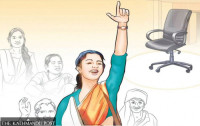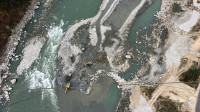National
Conflict victims decry government’s consultations as a sham
The consultations were not aimed at ensuring justice but simply at showing the world that feedback was collected, victims say..jpg&w=900&height=601)
Binod Ghimire
The Supreme Court in February 2015 struck down around a dozen of amnesty provisions in the Enforced Disappearances Enquiry and Truth and Reconciliation Act 2014 and directed the government to amend it after broader consultation, especially with conflict victims. But in the last five years, there has been little progress.
Conflict victims, rights activists and the international community have all constantly reminded the government of its obligations. With pressure mounting to conclude the transitional justice process, as Nepal will have to showcase all it has done to uphold human rights during OHCHR’s Universal Periodic Review meeting to be held later this year, the government had decided to finally hold consultations with conflict victims.
But as victims and human rights defenders had feared, the consultations held on Monday, in the headquarters of all seven provinces, were more formality than genuine efforts to listen to their grievances and concerns.
According to participants, consultations were held in two sessions—three hours with victims and another three hours with human rights defenders, civil society members, security forces and the media.
Conflict victims and human rights defenders described the entire process as a farce.
“Some of our friends couldn’t even put forth their concerns due to time constraints,” Badri KC, a conflict victim from Baglung who was present at the consultation in Pokhara, told the Post. “Rather than listening to our voices, the discussion was aimed at showing that the government has taken our feedback to amend the Act.”
The Ministry of Law and Justice, which organised the consultations, only allowed five victims from each victims’ organisation to speak. In some places, victims themselves had to demand that they be included in the process.
Victims also said that three hours was not nearly adequate to collect feedback on an important issue like transitional justice. They had been demanding that consultations be conducted in every district by putting victims into different groups based on the nature of their suffering. However, discussions were only held in the provincial headquarters and many districts didn’t have representation.
Victims’ organisations say that the needs and concerns of victims of rape are different from those whose family members were killed during the insurgency. Therefore, collecting suggestions from all kinds of victims at the same time is meaningless, they say.
The ministry even provided victims with the questionnaire to be answered only a few hours before consultations were held, despite demands that victims and human rights organisations be provided access a lot earlier.
“The discussion was just a formality,” Shree Kumari Budha, whose father was killed by the Maoists in Thawang, Rolpa and who was present at the consultation in Butwal, told the Post. “I am not at all hopeful about our concerns being incorporated in the Act.”
Human rights defenders say that the government’s attempts to conclude consultations in a single day on an issue like transitional justice says a lot about its intention. Successive governments have already wasted years and have little desire to take victims into confidence, they say.
But according to human rights defenders, any attempt to move the process forward without the victims is meaningless.
“The consultation must be wider, more inclusive and constructive,” Nirajan Thapaliya, director of Amnesty International Nepal, told the Post. “Discussions like the ones held on Monday cannot serve the real need of victims.”
Victims’ organisations said that they participated in consultations with reservations. They even resorted to demonstrations at one consultation venue. In Kathmandu, a group of victims organised a protest in Maitighar, arguing that the government’s consultations were not aimed at ensuring justice but only at showing the world that it collected feedback.
Despite promises at national and international forums, including the United Nations, the govenrment has done precious little to take the transitional justice forward. The two commissions formed to look into war-era crimes—the Truth and Reconciliation Commission and Commission on Investigation on Enforced Disappeared Persons—are without officials since mid-April.
A committee formed to recommend officials has failed to make any progress, as major political parties—the ruling and opposition—have been jostling to install their own men in the commissions.
Officials involved in the consultation process, however, defended their efforts, describing it as the government’s genuine attempt to collect suggestions from the victims.
“The victims have given important suggestions. If they (victims) still feel like giving their feedback, they can write to us,” Himal Aryal, an official at the Law Ministry who was deployed in Pokhara for consultation, told the Post. “It would be wrong to say the consultation was just a formality.”




 10.17°C Kathmandu
10.17°C Kathmandu














